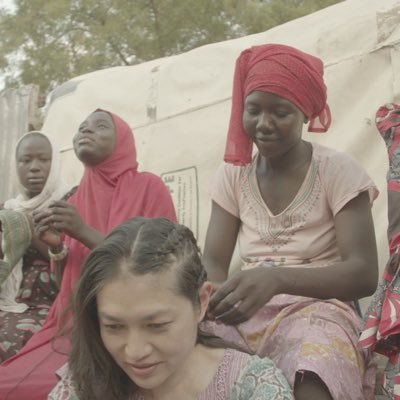
Canadian journalist Mellissa Fung went deep into Boko Haram-occupied territory in Nigeria to interview some of the young girls who escaped after being held hostage by the terrorist group in 2018 for her new documentary.
The result was “Captive,” a film that examines the girls’ pain, suffering and mental health, while reflecting on Fung’s own experience of being kidnapped while reporting in Afghanistan.
“The word ‘kidnapping’ is a trigger word for me,” Fung notes.
In 2017, she took conflict safety training and embarked on a journey to northeastern Nigeria – a section of the country dominated by the militant group.
She spent the next four years interviewing survivors and preparing to tell their stories. She says she felt compelled to do so after the trauma she suffered in Afghanistan back in 2008. While on assignment, Fung was kidnapped and chained to the inside of tiny dark cave. It took weeks of negotiations until she was freed.
“In April of 2014, we all woke up one morning to find out 276 girls had been kidnapped from their school in Chibok Nigeria and I was horrified,” Fung recalls.
She soon discovered those Nigerian schoolgirls were just the tip of the iceberg. At the peak of Boko Haram’s activities in 2014-15, the United Nations Children’s Fund estimates that 1.4 million children were displaced from their homes.
Boko Haram continues to conduct attacks and mass kidnappings. In December 2020, more than 340 schoolboys were abducted in an attack that Boko Haram has taken credit for. Reuters reports that Nigerian authorities said at the time that they had recovered most, but not all, of the boys.
Fung says her own experiences informed how she spoke with survivors.
“We were able to have these really honest conversations between captives,” she says.
At one point in her documentary, a woman explains to Fung that when she refused to marry a Boko Haram soldier, they cut her left hand. Fung reaches out and shows her own stab wound from her kidnappers.
When Fung returned to Canada after her kidnapping, she was able to see trauma therapists as she processed what happened to her. She says she knows she is privileged compared to the Nigerian women.
A Nigerian doctor explained to her: “It’s the last thing we think about because most people are more worried about food, shelter, security … is Boko Haram going to come back? Mental health is a luxury.”
Fung wrote a best-selling memoir “Under an Afghan Sky,” documenting what happened during her 28-day captivity, but this is the first time she is sharing more of the aftermath that came from that trauma.
“We don’t talk about this stuff enough: that women and girls disproportionately suffer in conflict,” she says. “A lot of that has to do with gender-based violence – sexual violence.”
“Captive” airs on TVO on Tuesday Feb. 16.
CityNews








